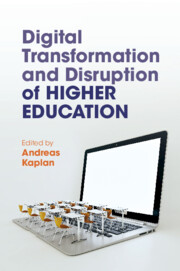Book contents
- Digital Transformation and Disruption of Higher Education
- Digital Transformation and Disruption of Higher Education
- Copyright page
- Contents
- Figures
- Tables
- Contributors
- Preface
- Chapter 1 Nothing Is Constant Except Change
- Part I (R)evolution of the Higher Education Sector
- Part II Changes in Teaching Formats
- Chapter 7 Contemporary Changes in Teaching Formats
- Chapter 8 Digital Transformation in Teaching and Learning
- Chapter 9 Blending Emerging Technologies for Student-Centred Teaching
- Chapter 10 Artificial Intelligence
- Chapter 11 Quality Assurance and Enhancement
- Part III Changes in Teaching Content
- Part IV Networking and Social Activities
- Part V Certification and Diplomas
- Part VI Careers and Professionalisation
- Part VII Futuristic and Ultramodern Higher Education
- Part VIII Higher Education in Motion
- Editor’s Biography
- Index
- References
Chapter 10 - Artificial Intelligence
An Adaptive Learning Methodology
from Part II - Changes in Teaching Formats
Published online by Cambridge University Press: 09 June 2022
- Digital Transformation and Disruption of Higher Education
- Digital Transformation and Disruption of Higher Education
- Copyright page
- Contents
- Figures
- Tables
- Contributors
- Preface
- Chapter 1 Nothing Is Constant Except Change
- Part I (R)evolution of the Higher Education Sector
- Part II Changes in Teaching Formats
- Chapter 7 Contemporary Changes in Teaching Formats
- Chapter 8 Digital Transformation in Teaching and Learning
- Chapter 9 Blending Emerging Technologies for Student-Centred Teaching
- Chapter 10 Artificial Intelligence
- Chapter 11 Quality Assurance and Enhancement
- Part III Changes in Teaching Content
- Part IV Networking and Social Activities
- Part V Certification and Diplomas
- Part VI Careers and Professionalisation
- Part VII Futuristic and Ultramodern Higher Education
- Part VIII Higher Education in Motion
- Editor’s Biography
- Index
- References
Summary
Adaptive learning is not new. Yet, with the rapid advances in the field of artificial intelligence and the global shift to online education, which occurred almost overnight due to the Covid-19 pandemic, adaptive learning is seen by many as a promising path to a smarter higher education. This chapter aims to shed light on both the opportunities and the challenges of the adoption of adaptive learning in higher education. The cases of universities, business schools and corporate universities adopting this approach are used to illustrate the role and benefits of adaptive learning powered by artificial intelligence at the current stage. The chapter concludes with an open call for academic experts and regulatory agencies to hold adaptive learning up as the defining shift in the future of education. It will likely become the established approach in education, filling the existing gaps in knowledge procurement.
Keywords
Information
- Type
- Chapter
- Information
- Digital Transformation and Disruption of Higher Education , pp. 120 - 129Publisher: Cambridge University PressPrint publication year: 2022
